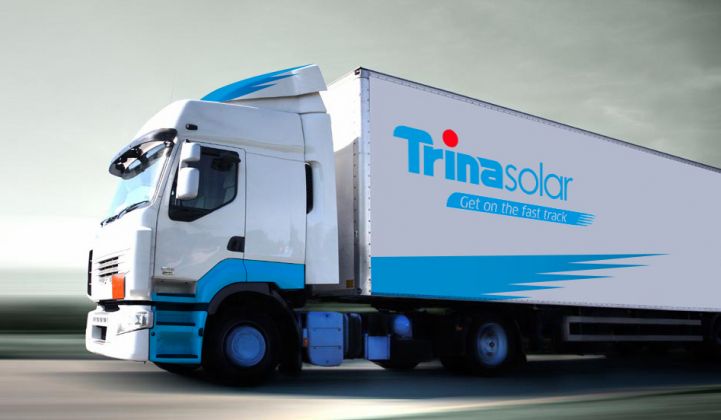Trina Solar, a China-based vertically integrated solar module manufacturer, went public on the New York Stock Exchange in December 2006 and became one of the globe's top five solar suppliers. Now, a decade later, the company is going private.
As part of the going private process, Trina is merging with Fortune Solar Holdings and Red Viburnum in an all-cash transaction that suggests an equity value of approximately $1.1 billion. According to a press release, "The merger consideration represents a premium of 21.5 percent to the closing price of the Company's ADSs on December 11, 2015." The investor consortium includes Shanghai Xingsheng Equity Investment & Management Co., Shanghai Xingjing Investment Management Co., Great Zhongou Asset Management, Liuan Xinshi Asset Management, and members of the company's executive team.
The offer was originally made in December of last year and the deal price has not changed.
Investment firm Roth Capital Partners writes, "We are frankly surprised that the deal is continuing at the original price given the backdrop of deteriorating fundamentals with ASPs dropping sharply on industry oversupply. We would recommend TSL shareholders to take the offer, as we expect fundamentals in the industry to remain challenged for the next year and a half." Roth notes that risks to the deal include "waning government policy and subsidy support," as well as international trade tariffs and "potential module supply/demand imbalance."
According to GTM Research, Trina shipped 3.3 gigawatts of solar in 2014 and almost 5 gigawatts in 2015. The solar-panel builder has some active R&D with "early trials of highly efficient cells using interdigitated back-contact technology" that has reached an efficiency of 23.1 percent with "an average efficiency of greater than 22 percent."
The last decade saw a wave of Chinese solar firms listing and raising money on American exchanges -- with mixed results. One-time market leader Suntech America went bankrupt in 2013. One-time market leader Yingli Solar received a delisting notice from the New York Stock Exchange for not maintaining the minimum average share value earlier this year. (Yingli amassed $209 million in losses in 2015 -- marking the third unprofitable year in a row for the company.)
JA Solar was offered an early go-private proposal in 2015. But it's difficult to call this a market trend for Chinese manufacturers currently listed on U.S. exchanges. Perhaps the next step for a newly private Chinese solar company is to eventually list and raise expansion capital on a domestic Asian exchange with a more optimistic view of the solar industry.



